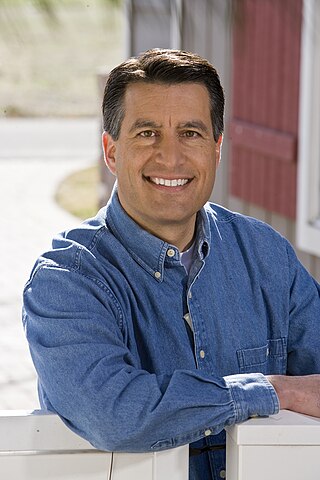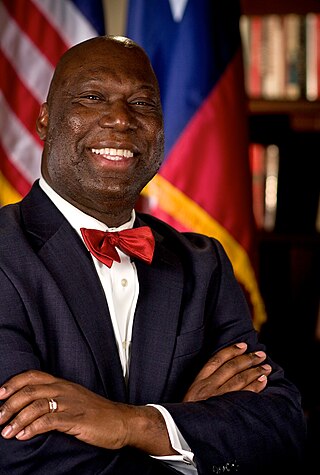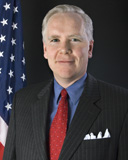Related Research Articles

The Federal Energy Regulatory Commission (FERC) is an independent agency of the United States government that regulates the interstate transmission and wholesale sale of electricity and natural gas and regulates the prices of interstate transport of petroleum by pipeline. FERC also reviews proposals to build interstate natural gas pipelines, natural gas storage projects, and liquefied natural gas (LNG) terminals, in addition to licensing non-federal hydropower projects.

A public utility company is an organization that maintains the infrastructure for a public service. Public utilities are subject to forms of public control and regulation ranging from local community-based groups to statewide government monopolies.
The 2000–2001 California electricity crisis, also known as the Western U.S. energy crisis of 2000 and 2001, was a period of time during which the U.S. state of California had a shortage of electricity supply caused by market manipulations and capped retail electricity prices. The state suffered from multiple large-scale blackouts, one of the state's largest energy companies collapsed, and the economic fall-out greatly harmed Governor Gray Davis's standing.

Ralph Webster Yarborough was an American politician and lawyer. He was a Texas Democratic politician who served in the United States Senate from 1957 to 1971 and was a leader of the progressive wing of his party. Along with Senate Majority Leader Lyndon B. Johnson and Speaker of the House Sam Rayburn, but unlike most Southern congressmen, Yarborough refused to support the 1956 Southern Manifesto, which called for resistance to the racial integration of schools and other public places. Yarborough voted in favor of the Civil Rights Acts of 1957, 1960, 1964, and 1968, as well as the 24th Amendment to the U.S. Constitution, the Voting Rights Act of 1965, and the confirmation of Thurgood Marshall to the U.S. Supreme Court. Yarborough was the only senator from a state that was part of the Confederacy to vote for all five bills.

James Stephen Peace is an American writer, actor, and producer, best known for the Attack of the Killer Tomatoes! film series. A politician belonging to the Democratic Party, Peace served in the California State Assembly from 1982–1992 and in the California State Senate from 1993–2002.

Brian Edward Sandoval is an American politician, academic administrator, and former federal judge who served as the 29th Governor of Nevada from 2011 to 2019.
Vinson & Elkins LLP is an international law firm with approximately 700 lawyers worldwide headquartered in Downtown Houston, Texas.

The Public Utility Regulatory Policies Act is a United States Act passed as part of the National Energy Act. It was meant to promote energy conservation and promote greater use of domestic energy and renewable energy. The law was created in response to the 1973 energy crisis, and one year in advance of a second energy crisis.

The Energy Policy Act of 2005 is a federal law signed by President George W. Bush on August 8, 2005, at Sandia National Laboratories in Albuquerque, New Mexico. The act, described by proponents as an attempt to combat growing energy problems, changed US energy policy by providing tax incentives and loan guarantees for energy production of various types. The most consequential aspect of the law was to greatly increase ethanol production to be blended with gasoline. The law also repealed the Public Utility Holding Company Act of 1935, effective February 2006.

The Railroad Commission of Texas is the state agency that regulates the oil and gas industry, gas utilities, pipeline safety, safety in the liquefied petroleum gas industry, and surface coal and uranium mining. Despite its name, it ceased regulating railroads in 2005, when the last of the rail functions were transferred to the Texas Department of Transportation.

The Electric Reliability Council of Texas, Inc. (ERCOT) is an American organization that operates Texas's electrical grid, the Texas Interconnection, which supplies power to more than 25 million Texas customers and represents 90 percent of the state's electric load. ERCOT is the first independent system operator (ISO) in the United States. ERCOT works with the Texas Reliability Entity (TRE), one of six regional entities within the North American Electric Reliability Corporation (NERC) that coordinate to improve reliability of the bulk power grid.

Michael Lawrence Williams is an American educator and attorney who is the former Education Commissioner of the U.S. state of Texas, in which capacity he was leader of the Texas Education Agency. Williams was appointed to the position on August 27, 2012, by then Governor Rick Perry. On October 15, 2015, Williams announced that he would step down as Education Commissioner at the end of the year to return to the private sector.

George W. Bush served as the 46th governor of Texas from 1995 until 2000, when he resigned as governor amid his transition into the U.S. presidency after having been elected president in the 2000 United States presidential election. As governor, Bush successfully sponsored legislation for tort reform, increased education funding, set higher standards for schools, and reformed the criminal justice system. Bush also pioneered faith-based welfare programs and helped make Texas the leading producer of wind powered electricity in the U.S.

Jon B. Wellinghoff is an American attorney who served as the chairman of the Federal Energy Regulatory Commission (FERC) from 2009 to 2013. The FERC is a U.S. government agency that regulates the interstate transmission of electricity, natural gas, and oil. The FERC also reviews proposals to build liquefied natural gas (LNG) terminals and interstate natural gas pipelines and licenses hydropower projects.

The Public Utility Commission of Texas is a state agency that regulates the state’s electric, water and telecommunication utilities, implements respective legislation, and offers customer assistance in resolving consumer complaints.
The National Association of Regulatory Utility Commissioners (NARUC) is the national association representing the U.S. state public service commissioners who regulate essential utility services, including energy, telecommunications, and water. Founded in 1889, the Association is a resource for its members and the regulatory community, providing a venue to set and influence public policy, share best practices, and foster solutions to improve regulation.

Joseph Timothy Kelliher is an American energy executive and former chairman of the Federal Energy Regulatory Commission (FERC).
United States energy law is a function of the federal government, states, and local governments. At the federal level, it is regulated extensively through the United States Department of Energy. Every state, the federal government, and the District of Columbia collect some motor vehicle excise taxes. Specifically, these are excise taxes on gasoline, diesel fuel, and gasohol. While many western states rely a great deal on severance taxes on oil, gas, and mineral production for revenue, most states get a relatively small amount of their revenue from such sources.
Michael J. Osborne is an author, inventor, entrepreneur, and energy policymaker. He was one of three founding members of the Texas Renewable Energy Industries Alliance (TREIA). His public service appointments have included the steering committees of the State of Texas Energy Policy Partnership (STEPP) and the Sustainable Energy Development Council under Governor Ann Richards; and later, the Texas Energy Coordination Council appointed by Governor George W. Bush. As chair of the Austin Electric Utility Commission, Osborne has traveled internationally to speak and consult about the Texas energy experience. In 2015, he was part of the Austin, Texas, delegation to the 2015 United Nations Climate Change Conference held in Paris, France.

In February 2021, the state of Texas suffered a major power crisis, which came about during three severe winter storms sweeping across the United States on February 10–11, 13–17, and 15–20. The storms triggered the worst energy infrastructure failure in Texas state history, leading to shortages of water, food, and heat. More than 4.5 million homes and businesses were left without power, some for several days. At least 246 people were killed directly or indirectly, with some estimates as high as 702 killed as a result of the crisis.
References
- 1 2 3 4 "Austin lawyer nominated for utility agency", Austin American-Statesman (February 2, 1995), p. 19.
- ↑ "Wood appointed new chairman of Public Utility Commission", San Angelo Standard-Times (June 23, 1995), p. 3.
- 1 2 "Bush FERC nominees not seen as price cap foes", The Sacramento Bee (March 28, 2001), p. A16.
- ↑ Justin Blum, "Hackers set sights on nation's power grid", The Fresno Bee (March 12, 2005), p. A6.
- ↑ Jonathan Peterson, "New energy regulator lays out course", The Los Angeles Times (August 8, 2005), p. A17, A19.
